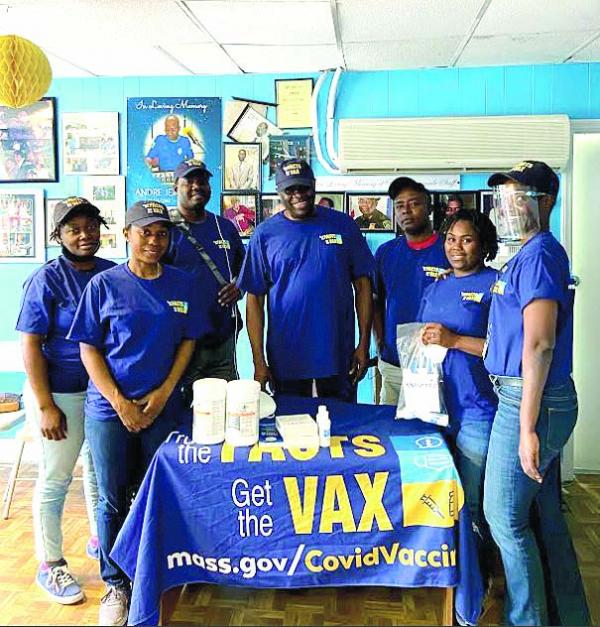June 10, 2021

A street team led by Oswald Neptune, center, is shown in the Mattapan offices of Ethnic Vision Marketing Group before a day of canvassing to encourage people— mainly Haitian Americans— to get the Covid vaccine. Rebeca Pereira photo
Oswald Neptune’s troop of workers hits the streets of Mattapan and Hyde Park every weekday, pairing off for door-to-door canvassing along predetermined routes and visibility standouts in Mattapan Square and inside Mattapan Station, areas with heavy foot traffic and a substantial Haitian population.
Braving the heat with a ball cap on his head and a chilled water bottle in hand, Neptune— a well-known radio personality— dishes out pep talks and delegates shifts to a 12-person team whose mission is clear: Reach out to as many pedestrians as possible, especially the ones who’d rather not be bothered, and talk facts about the coronavirus vaccines with them.
“There are other organizations operating mobile clinics and doing other very important work, but we’re tasked with something special, and that is making direct contact with people,” said Neptune. “We help disseminate information, dispel false beliefs, and build trust in vaccines; we do it through direct contact with the community.”
The effort is part of an initiative deployed by the state Department of Public Health (DPH), which has identified 20 cities and towns disproportionately impacted by Covid-19 and dispensed additional financial support for grassroots vaccination outreach within those communities. With boots on the ground every day in wards across Boston, the department is rooting for increased rates of doses.
“The loss of life and suffering from Covid-19 has been profound, with a disproportionate impact in communities already bearing a significant burden of illness and disease,” said Public Health Commissioner Dr. Monica Bharel. “These programs are what we need now, bringing vaccination to where people are and enabling everyone to have access to the vaccine.”
For their part, Neptune and his team fan out down the length of Blue Hill Ave. – a thoroughfare already peppered with printed reminders to mask up, social distance, and get jabbed – with Boston’s Haitian community in mind. Existing outreach materials are more likely to reach their target audience and to be efficacious when distributed by partners with a strong cultural kinship with the surrounding community, Neptune noted.
“Flyers don’t speak,” he said, “but when we’re out there, people see us as the experts and trust us to ask questions and get honest, true answers.”
In the past, Neptune’s agency, Ethnic Vision Marketing Group, has focused on placing and monitoring advertisements on local Haitian radio stations, like Radio Concorde and Radio Tandem Kiskeya.
The group’s subcontract with Archipelago Strategies Group, Inc., a marketing and consumer engagement firm representing the Executive Office of Health and Human Services, marks its first foray into medical marketing; and while the work doesn’t involve voice acting and commercial scripts, canvassing for vaccine equity aligns squarely with the agency’s culturally oriented focus.
His twelve-person team literally speaks its audience’s language: Ethnic Vision’s volunteer-force is uniformly fluent in Haitian Kreyol, and language accessibility has always been the marketing agency’s primary concern.
“The government is advocating for vaccines at all levels, but it doesn’t make any difference if people can’t relate to the messenger,” said Neptune. “When people realize there’s a Kreyol-speaking Haitian on their porch, there’s a sense of trust that happens almost immediately, and any initial resistance they may have to a complete stranger falls away.”
Field ambassadors receive two days of training from DPH before launching their respective canvassing efforts, and team captains are encouraged to participate in weekly training sessions where they receive updates from community health centers and local medical professionals around the progression of the virus and of vaccine equity initiatives.
This week, the virtual public health panel is tackling vaccine hesitancy, a salient barrier against Ethnic Vision’s field work in Mattapan and in Hyde Park. DHS supports canvassers with weekly shipments of sanitary kits, flyers, canvassing literature, and eclectic swag that reads ‘Trust the Facts, Get the Vax.’ But most of the groundwork, including encounters with recalcitrant neighbors, is carried out by subcontracted groups.
Field ambassador Muoi Sainti, who attends Greater Boston Nazarene Compassionate Center and routinely volunteers at the majority-Haitian church’s vaccine clinics, shared anecdotally that “people aren’t so much opposed to vaccines as they are misinformed about their effect and they’re also scared.
“Some people tell you that they’ve already gotten the vaccine or have scheduled an appointment to receive the vaccine,” he said, “but sometimes they believe myths about vaccines and it becomes very difficult to break through those misconceptions.”
“When we head out, we give the facts visibility, and that’s how we’re able to reach people,” she said.




